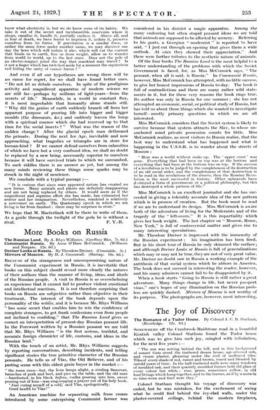More Books on Russia
BECAUSE of the strangeness and uncompromising nature of the Communist experiment in Russia, it is inevitable that
books on this subject should reveal more clearly the natures of their authors than the manner of living, ideas, and ideals of the Russian people. A visit to Russia is so overwhelming an experience that it cannot fail to produce violent emotional and intellectual reactions. It is not therefore surprising that books on Russia are subjective rather than objective in their treatment. The interest of the book depends upon the personality of the writer, and it is because Mr. Rhys Williams "has some secret that enables him to win the confidence of complete strangers, to get frank confessions even from people not inclined to confiding," that The Russian Land gives so correct an interpretation of present-day Russian peasant life.
In the Foreword written by a Russian peasant we are told that Mr. Rhys Williams "is the first serious, truthful, and accurate foreign chronicler of life, customs, and ideas in the Russian land."
With the touch of an artist, Mr. Rhys Williams suggests by reporting conversations, describing incidents, and telling significant stories the true primitive character of the Russian peasants. He tells us of Vies, the Old Believer, and of his parting scene with this oldest grain buyer in the market
the room oven—hot, the Icon lamps alight, a sizzling Samovar, haunches of pork and beef, and pies on the table, and the old man —barefooted, in his black kaftan, vodka pouring into him, sweat pouring out of him—was sing-songing a prayer out of his holy book.
'Just curing myself of a cold,' said Vlas, apologetically. Good health to Vlas !"
An American machine for separating milk from cream introduced by some enterprising Communist farmer was considered in his district a magic apparatus. Among the many endearing but often stupid peasant ideas we are told that animals are supposed to be affected by scenery. Referring to his goats, a Georgian " modernist " is reported to have said, "I just cut through an opening that gives them a wide outlook. At once they showed their appreciation." And there were further tributes to the aesthetic nature of animals.
Of the four books The Russian Land is the most helpful to a better understanding of the problems with which the Soviet Government is faced, for, as Miss McCormick says, "The peasant, when all is said, is Russia." In Communist Russia, however, Miss McCormick has attempted, with no little success; to give her honest impressions of Russia to-day. The book is full of contradictions and there are many rather wild state- ments in it, but for these very reasons the book rings true. Its author was only in Russia for one summer ; she has not attempted an economic, social, or political study of Russia, but has told us about those things which she wanted to investigate herself—mostly primary questions in which we are all interested.
Miss McCormick considers that the Soviet system is likely to survive because that system attracts the Slav, to whose un- anchored mind private possession counts for little. Miss McCormick realizes, as most visitors to Russia realize, that the best way to understand what has happened and what is happening in the U.S.S.R. is to wander about the streets of Moscow :
"Here was a world without make-up. The upper crust' was gone. Everything that had been on top was at the bottom and everything that had been at the bottom was on top. If the success of a revolution is to be judged by the completeness of its destruction of an old social order, and the completeness of that destruction is to be read in the revelations of the streets, then the Russian Revo- lution is the most successful in history. Other upheavals have destroyed a form of government or a political philosophy, but this has destroyed a whole pattern of life.'
Miss McCormick is an excellent journalist and she has suc- ceeded in giving a tolerably accurate idea of the new pattern which is in process of creation. But the book must be read if we are to understand its design. Miss McCormick is aware both of the adventure of living for the Modernists and of the tragedy of the left-overs." It is this impartiality which gives her book weight. The last chapter on "Moscow, Rome, New York," is full of controversial matter and gives rise to many interesting speculations.
Mr. Theodore Dreiser is impressed with the immensity of the Russian experiment ; his imagination has been fired. But in his short tour of Russia he only skimmed the surface ; and although Dreiser Looks at Russia is full of generalizations which may or may not be true, they are not of very great value. Mr. Dreiser no doubt saw in Russia a working example of the antithesis of that social system which he abhors in America. The book does not succeed in interesting the reader, however, and his many admirers cannot fail to be disappointed by it. When a book starts "Going to Russia is still rather a great adventure. Many things change in life, but never passport visas," one's hopes of any illumination on the Russian prob- lem are quickly dashed. Mirrors of Moscow is not worthy of its purpose. The photographs are, however, most interesting.






























 Previous page
Previous page